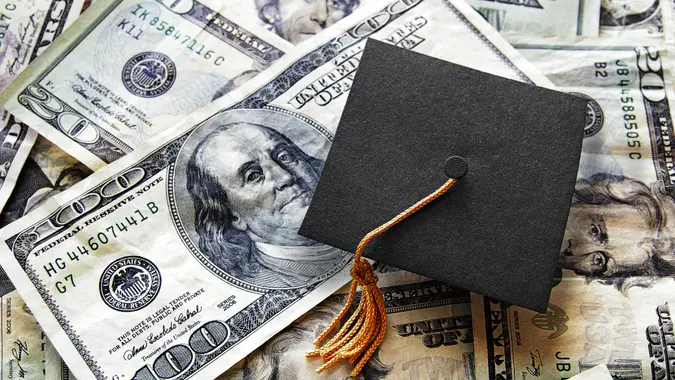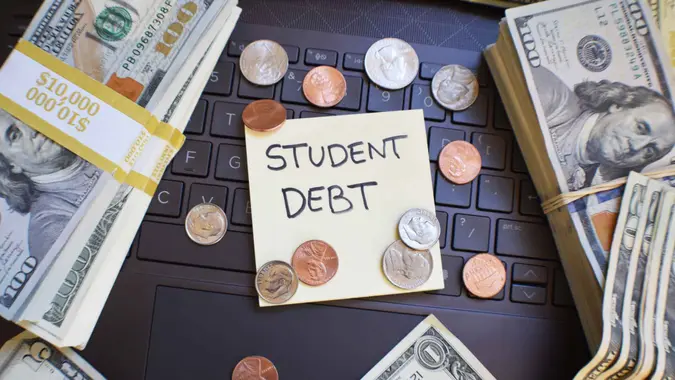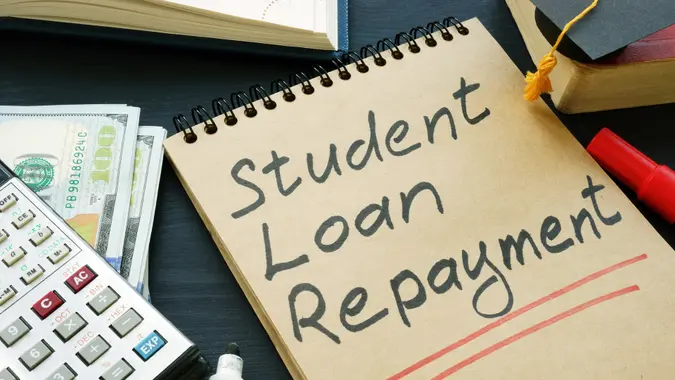Women Top the Student Loan Debt Charts: 11 Tips To Pay Down Your Loans Quicker

Commitment to Our Readers
GOBankingRates' editorial team is committed to bringing you unbiased reviews and information. We use data-driven methodologies to evaluate financial products and services - our reviews and ratings are not influenced by advertisers. You can read more about our editorial guidelines and our products and services review methodology.

20 Years
Helping You Live Richer

Reviewed
by Experts

Trusted by
Millions of Readers
Student loan debt is massive in the United States, to the tune of more than $1.73 trillion, according to the Federal Reserve. Nearly two-thirds of that debt is held by women, according to a recent AAUW study.
Women who graduate with bachelor’s degrees tend to owe around $2,700 more than men and take two more years to pay off their loans than men on average, likely accruing more interest along the way.
While this may seem disheartening, given that women also face the gender pay gap once they start working, where they still make less than men.
GOBankingRates consulted experts to go in-depth on ways to help women pay down their student loans quicker.
Invest While You Pay Off
“A typical student loan may take years or even decades to pay off, so don’t be shy about investing while you pay off those loans, even if it’s just a few bucks at a time,” said Seth Wunder, CFA, CFO and CIO at Acorns.
Long-term returns on stocks have historically outpaced student loan interest rates. For example, the S&P 500 average return over the past decade is about 12% annually while the current student loan interest rate is 5.5%.
“So the sooner you invest, the more your money can work for you because it compounds over time,” said Wunder.
Invest In Spare Change
If you’re finding it difficult to set aside extra money, taking advantage of resources like investing apps for beginners could be a powerful solution.
“When you open an investment account and link your bank accounts and credit cards,” Wunder said, “you can round up your purchases to the nearest full dollar and deposit the difference into your investment account to start building your wealth and paying off debt faster.”
Review Your Monthly Costs
Review your credit card and bank statements monthly and look for any subscriptions or recurring charges for services you don’t use.
“These costs can add up without you realizing, things like monthly subscriptions and daily coffees,” Wunder said. “By reining in these expenses, you can put more money aside to pay off your loans.”
Open High-Yield Savings Accounts
Rather than stashing money in a checking or basic savings account, open a high-yield account instead.
“High-yield accounts offer higher annual percentage yields (APYs) than standard accounts,” Wunder said, “so your money can grow faster, which gives you a chance to make bigger payments.”
Don’t Pay Nothing
The worst thing you can do is nothing.
“Paying off loans, in addition to building savings, can be possible for everyone,” Wunder said. “Some resources exist to make getting started easy and take the stress out of making an effort to set money aside. Additionally, the faster you repay your loans, the more money you can save in the long term.”
Double Your Payments
With any debt, sometimes making multiple payments per month can be a good way to reduce your interest payments and pay down your debt faster, according to Carter Seuthe, CEO, of Credit Summit Consolidation.
“I have also seen students have success when they make paying off student debt their financial priority,” Seuthe said. “This can be especially accessible for people who might have had circumstances where they didn’t need to take out loans to cover their entire education.”
Start With the End in Mind
If you’re considering taking on loans but haven’t yet, Robin Snell, CFP, enrolled agent and owner of Nested Financial & Tax Planning suggested, “Before you spend a single dollar, it’s crucial to create a simple plan for your money. Take a moment to identify where you want to intentionally allocate your money and pinpoint the goals that hold significant importance to you.”
This includes keeping track of what you earn and what you spend to carve out places where you might be able to save some cash.
“Then, make sure to put those extra savings towards paying off your student loans,” Snell said. “By clearly defining your goals and knowing how much you can spend, you can make informed decisions about allocating your resources and ensure your financial choices with your aspirations.”
Boost Your Income
Additionally, see if you can explore avenues to increase your earnings, Snell said, whether through securing a part-time position, freelancing or advocating for a salary raise at your current job.
“It’s noteworthy that research shows women are less likely to negotiate their salaries compared to men, but every extra dollar you bring in can accelerate your journey to paying off your loans,” said Snell.
Refinance or Consolidate Loans
Snell also recommended refinancing your student loans, decreasing your interest rate and shrinking your monthly payments.
“This move can save you money on interest in the long haul and expedite your loan repayment process,” Snell said. “However, exercise caution, particularly with federal loans, as refinancing may result in forfeiting benefits like income-driven repayment plans and loan forgiveness programs.”
Maximize Employer Benefits
It’s worthwhile to explore the perks offered by your employer, as some companies now provide student loan repayment assistance as part of their benefits package, Snell said.
“Take the initiative to inquire whether you qualify for such programs, which can significantly accelerate your loan repayment journey,” Snell said. “Moreover, with the introduction of new 401(k) loan pay-off provisions, some employers may offer innovative options allowing you to allocate a portion of your retirement savings towards paying off your student loans.”
As with any financial decision, Snell said, “Be sure to thoroughly understand the terms and conditions of these benefits to make informed decisions about leveraging them to your advantage.”
Explore Loan Forgiveness Programs
Lastly, Snell urged people to look at loan forgiveness programs to uncover potential opportunities for debt relief.
“Take the time to thoroughly explore whether you meet the criteria for specific programs, such as Public Service Loan Forgiveness (PSLF) or Teacher Loan Forgiveness, particularly if your profession aligns with qualifying fields,” Snell said. “For instance, if you work in public service, nonprofit organizations, or the education sector, you may be eligible for substantial loan forgiveness benefits.”
Whichever way you choose, there’s hopefully a repayment path that expedites your loans and gets you out of unnecessarily accrued interest.
 Written by
Written by  Edited by
Edited by 
























